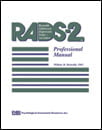
Reynolds Adolescent Depression Scale, 2nd Edition rads-2
For: Screen for depressive symptoms in adolescents ages 11-20 years
Reading Level: Adolescent
Format: Paper-and-Pencil
Length: 5-10 minutes
Scoring: Hand Scored
Online Forms, Reports, Kits & e-Manuals
All online resources including Forms, Reports, i-Admins, Kits and e-Manuals.
Printed Forms & Handscoring Materials
Test forms, response booklets and scoring reference manuals.
RADS-2 online Score Report (each) min order 5
RADS-2 online i-Admin (each) min order 5
RADS-2 Hand Scorable Test Booklets (25)
Sample Reports
Author
William M. Reynolds PhD
Description
The original RADS has been used by thousands of clinicians, school personnel and researchers to evaluate depression in adolescents in the U.S. and over 30 other countries.
The RADS-2 is a brief, 30-item self-report measure that includes subscales which evaluate the current level of an adolescent’s depressive symptomatology along four basic dimensions of depression: Dysphoric Mood, Anhedonia/Negative Affect, Negative Self-Evaluation, and Somatic Complaints. Interpretation of these four subscales is based on both the nature of the depression domain and the item content of the subscale.
The RADS-2 standard (T) scores and associated clinical cut-off score provide the clinician or researcher with an indication of the clinical severity of the individual’s depressive symptoms (normal, mild, moderate or severe). Scores are plotted on a Summary/Profile Form, allowing comparison of elevations across subscales. Examining item endorsement levels within elevated subscales may provide further information about the nature of an adolescent’s reported symptomatology. In addition to the four subscale scores, the RADS-2 yields a Depression Total score that represents the overall severity of depressive symptomatology.
An empirically derived clinical cut-off score helps to identify adolescents who may be at risk for a depressive disorder or a related disorder. Data demonstrates the ability of this cut-off score to discriminate between adolescents with Major Depressive Disorder and an age- and gender-matched control group. The six RADS-2 critical items alert clinicians that an adolescent (with a Depression Total score below the clinical cut-off) may be experiencing a significant level of depression.
Features
Re-standardised with a new school-based sample of 3,300 adolescents that was stratified to reflect the 2000 U.S. Census data for gender and ethnicity.
Expanded age range includes individuals ages 11-20 years.
Four factorially derived subscales reflect four basic domains of adolescent depression.
Updated normative tables provide standard (T) scores in addition to percentile ranks for the Depression Total scale and four subscales.
New Professional Manual provides a comprehensive literature review.
Case studies illustrate expanded interpretation of subscale and Depression Total scale scores.
Carbonless, hand-scorable Test Booklet facilitates scoring and interpretation.
Reliability and Validity
Comprehensive data are presented to demonstrate the reliability and validity of the RADS-2. Reliability data (internal consistency, test-retest, and SEMs) are presented for the Depression Total scale and the four subscales. Validity of the RADS-2 was examined from a number of perspectives: content validity, criterion-related validity, construct validity (convergent, discriminant and factorial), and clinical validity. Reliability and validity studies included a school-based sample of over 9,000 adolescents and a clinical sample of 297 adolescents with DSM-III-R or DSM-IV diagnoses who were evaluated in both school and clinical settings. Extensive documentation of reliability and validity evidence for the RADS collected by the author and other researchers over a 20-year period is also presented.
NB: Prices are in Australian dollars inclusive of GST. NZ customers need to log in to view ex-GST prices.



